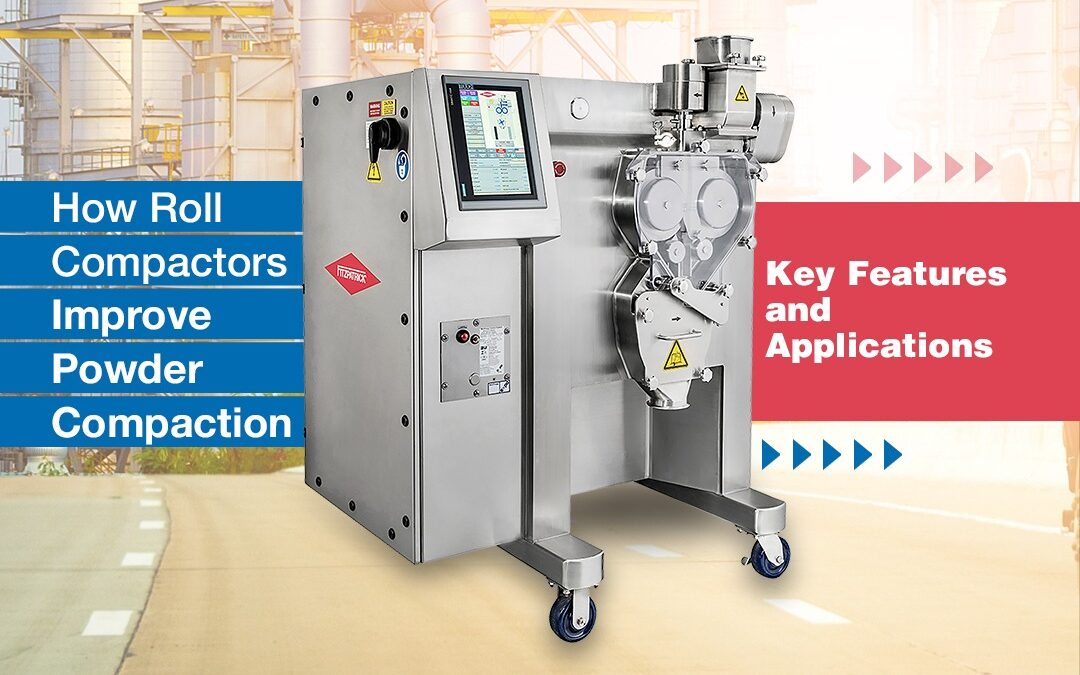Powder handling is a major challenge in industries like pharma, food, and chemicals. Fine powders create dust, flow inconsistently, and complicate downstream processes.
They also cause bulk density variations and dosing errors. Tablet compression or capsule filling becomes unreliable.
A
roll compactor solves these issues. It uses dry granulation to improve powder flow and density without liquid binders or drying steps.
This technology streamlines powder processing, saves energy, and protects sensitive ingredients. It’s clean, efficient, and scalable for any production size.
What Is Roll Compaction?
Roll compaction is a
dry granulation process. It compresses powders between two counter-rotating rolls.
The result is a compacted sheet or ribbon. This ribbon is then milled into uniform granules.
These granules have better flowability and consistent bulk density. They are ready for downstream steps like tablet pressing or mixing.
It eliminates binders and solvents. It does not require any drying stage. It works perfectly for heat-sensitive or moisture-sensitive materials.
It is energy-efficient and easy to scale from lab to production. For pharma and food applications, it ensures clean and safe processing.
How Roll Compactors Improve Powder Compaction?
A roll compactor enhances powder flowability. Granules reduce dust and make material handling easier.
- It creates consistent bulk density. Uniform granules improve dosing accuracy for tablets and capsules.
- It increases material yield. Less powder is wasted during compaction, improving process efficiency.
- It is environmentally friendly. Dry Granulation avoids water or solvent usage and eliminates drying steps.
- It is scalable. You can move easily from small-scale R&D batches to commercial production without changing critical parameters.
Key Features of a High-Performance Roll Compactor
- Gap and pressure control is critical.
Adjustable roll gaps and programmable pressure settings ensure uniform ribbons.
- A versatile feed system is essential.
It must handle free-flowing powders, cohesive materials, and even abrasive substances.
- Hygienic design matters for pharma and food.
GMP-compliant systems should have polished surfaces, tool-less disassembly, and CIP/SIP readiness.
- Advanced control systems improve consistency.
Automated roll speed, feed rate, and compaction force monitoring ensure repeatable results.
- Scalability is a must.
The same shear profile and granulation behaviour should carry from lab units to commercial systems.
Applications of Roll Compactors Across Industries
In
pharmaceuticals and nutraceuticals, a roll compactor granulates active ingredients and excipients. It ensures controlled dosage and better compressibility for tablets or capsules.
In food and beverages, it densifies cocoa, drink mixes, flavorings, and supplements. It improves flow and packaging efficiency.
In chemicals, it compacts specialty chemicals, pigments, catalysts, and agrochemicals. It reduces dust and enhances handling.
In batteries and energy storage, it granulates metal oxides and conductive powders for consistent electrode production.
In agriculture, it compacts micronutrients, fertilizers, and soil additives for uniform field application.
Choosing the Right Roll Compactor for Your Process
Start by analyzing powder properties. Know the particle size, flowability, and moisture sensitivity.
Define the desired granule size and density. Match them to downstream needs like blending or tableting.
Understand your throughput requirements. Know your daily production targets and batch sizes.
Consider maintenance and cleanability. Tool-less disassembly and hygienic surfaces reduce downtime.
Look for automation and control. Integration with MES or SCADA ensures consistency and data traceability.
Fitzpatrick Roll Compaction Solutions
Fitzpatrick is a trusted name in dry granulation. Their roll compactor designs offer precision and repeatability.
They feature precise roll gap and force control for consistent ribbons and granules.
Their modular designs make cleaning and maintenance fast and simple.
They provide lab-to-production scalability with matched shear profiles. You can develop at small scale and reproduce results in commercial batches.
These machines are robust. They handle 24/7 industrial operations reliably, serving both pharma and industrial plants.
IDEX MPT and IDEX India: Global Expertise, Local Support
IDEX MPT leads in powder processing innovation. Fitzpatrick is their flagship brand for roll compactor technology.
Through IDEX India, manufacturers get local expertise tailored to Indian needs. Factory-trained engineers and application specialists ensure smooth installation and commissioning.
They provide training, after-sales service, and regulatory compliance support. You also get access to global innovations adapted for regional operations.
Also Read: Why Particle Size Reduction is Crucial for Pharmaceutical
Conclusion
A roll compactor transforms powder handling. It eliminates the complexity of wet granulation, improves flowability, and ensures stable bulk density.
For industries where precision and cleanliness are critical, dry granulation is the ideal solution.
Fitzpatrick roll compactors from
IDEX MPT deliver consistent quality and scalable performance.
Connect with IDEX India and explore roll compaction solutions built for reliable, efficient manufacturing.
